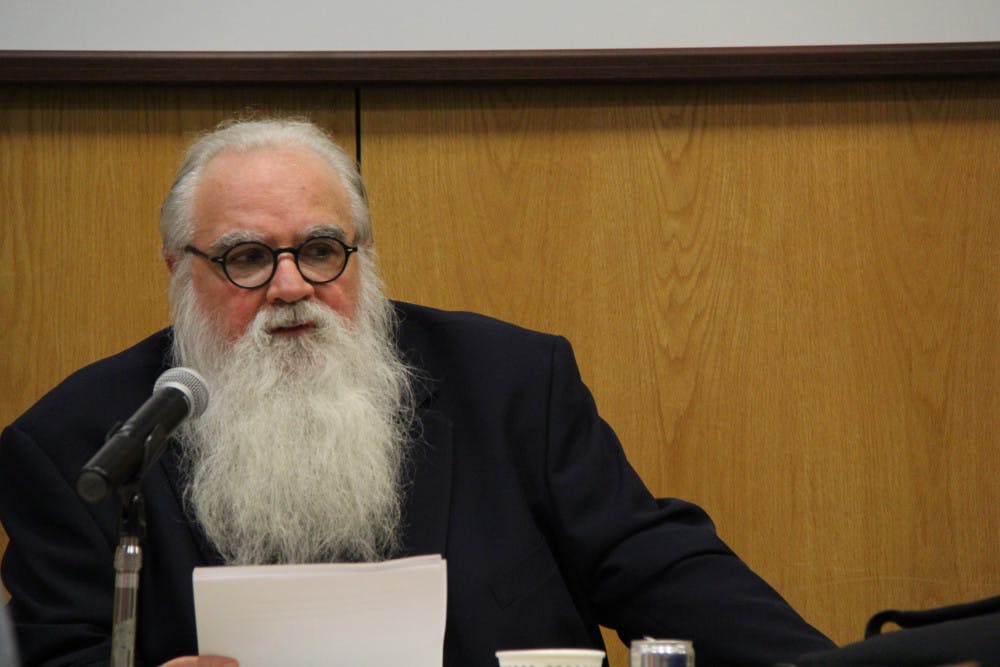On April 25, the Philosophy Department and the Dean’s Office of the College of Arts and Sciences featured a discussion by Dr. Noël Carroll, as part of the Philosopher’s Speak series.
Dr. Carroll is a professor of Philosophy at the Graduate Center, City University of New York. He is recognized for his work in the philosophy of literature, film, visual arts, and social and cultural theory.
[caption id="attachment_23144" align="alignnone" width="300"] Merinda Gruszecki/Staff Photographer[/caption]
The talk, entitled, “Literature, the Emotions, and Learning,” focused on the way in which literature contributes to emotional intelligence.
Carroll prefaced his talk with a disclaimer that there are other modes of emotional learning in literature.
However, Carroll argued that literature gives one the opportunity to enter the minds of characters as they experience and reflect upon their own motives, desires and ideas. In that way, a literary work can provide the reader with models that can be observed and easily imitated.
Carroll also discussed how literary texts can contribute to what people fee1. He used the example of Plato’s “Republic.” In this work, Plato was concerned with the prospective education of the children in the book. According to emotional intelligence, the reader will reflect and almost imitate Plato’s emotion.
As a result of this concept, Plato developed the first theory of the effective impact of literature and the emotional engagement with literature.
Carroll shared his hopes and what he wanted students to take away from the lecture.
“I hope that this lecture provides some ways for students to think about the emotions, specifically about their emotional engagement with literature and the narrative arts in general,” Carroll said.
Dr. Denise Vigani, assistant professor in the Philosophy Department, said she was very excited about Carroll’s talk.
“I completed my Ph.D. at the Graduate Center, CUNY,” Vigani said. “During my time there, I took several classes with Dr. Carroll and heard him deliver talks on a number of occasions. I knew that he would be an engaging speaker who would appeal widely to the Seton Hall community. I was thrilled when he accepted our invitation to participate in the Philosophers Speak lecture series.”
Patrick Barron, a senior English and economics major, thoroughly enjoyed Carroll’s lecture.
“It was a good talk,” he said. “Even though I am not a philosophy major, I appreciate the speaker’s perspective on the use of emotion and literature. The questions asked by the audience revealed that they were actively listening to the points that the Dr. Carroll posited towards us.”
Alecia Mobley, a senior broadcast major, explained what she got out of the talk.
“I originally came to get extra credit,” Mobley said. “But I learned so much about emotional engagement with literature. I really liked Dr. Carroll relating his points to well known works of literature like the “Illiad,” “Uncle Tom’s Cabin,” and even a pop culture reference to the Zombie Apocalypse.”
Schania Anderson can be reached at schania.anderson@student.shu.edu.
Merinda Gruszecki/Staff Photographer[/caption]
The talk, entitled, “Literature, the Emotions, and Learning,” focused on the way in which literature contributes to emotional intelligence.
Carroll prefaced his talk with a disclaimer that there are other modes of emotional learning in literature.
However, Carroll argued that literature gives one the opportunity to enter the minds of characters as they experience and reflect upon their own motives, desires and ideas. In that way, a literary work can provide the reader with models that can be observed and easily imitated.
Carroll also discussed how literary texts can contribute to what people fee1. He used the example of Plato’s “Republic.” In this work, Plato was concerned with the prospective education of the children in the book. According to emotional intelligence, the reader will reflect and almost imitate Plato’s emotion.
As a result of this concept, Plato developed the first theory of the effective impact of literature and the emotional engagement with literature.
Carroll shared his hopes and what he wanted students to take away from the lecture.
“I hope that this lecture provides some ways for students to think about the emotions, specifically about their emotional engagement with literature and the narrative arts in general,” Carroll said.
Dr. Denise Vigani, assistant professor in the Philosophy Department, said she was very excited about Carroll’s talk.
“I completed my Ph.D. at the Graduate Center, CUNY,” Vigani said. “During my time there, I took several classes with Dr. Carroll and heard him deliver talks on a number of occasions. I knew that he would be an engaging speaker who would appeal widely to the Seton Hall community. I was thrilled when he accepted our invitation to participate in the Philosophers Speak lecture series.”
Patrick Barron, a senior English and economics major, thoroughly enjoyed Carroll’s lecture.
“It was a good talk,” he said. “Even though I am not a philosophy major, I appreciate the speaker’s perspective on the use of emotion and literature. The questions asked by the audience revealed that they were actively listening to the points that the Dr. Carroll posited towards us.”
Alecia Mobley, a senior broadcast major, explained what she got out of the talk.
“I originally came to get extra credit,” Mobley said. “But I learned so much about emotional engagement with literature. I really liked Dr. Carroll relating his points to well known works of literature like the “Illiad,” “Uncle Tom’s Cabin,” and even a pop culture reference to the Zombie Apocalypse.”
Schania Anderson can be reached at schania.anderson@student.shu.edu.

Comments




